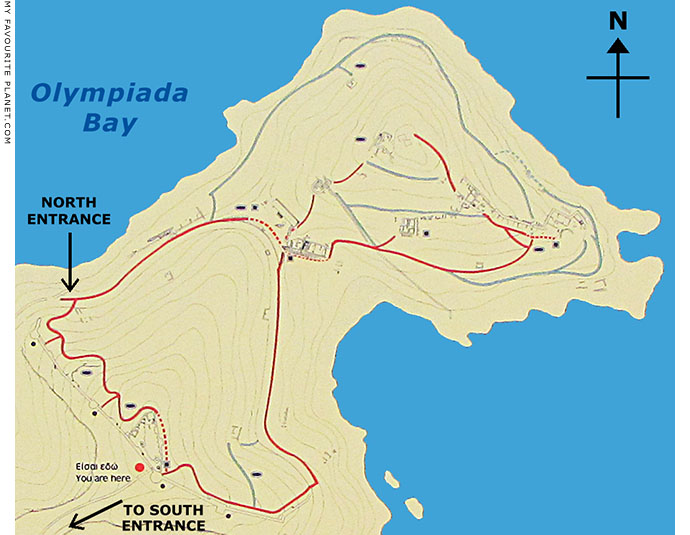|
|
| | My Favourite Planet > English > Europe > Greece > Macedonia > Stageira & Olympiada > Stageira gallery |
| Stageira & Olympiada |
Ancient Stageira gallery |
 |
 |
7 of 38 |
 |
 |
|
| |

Interactive map of Ancient Stageira archaeological site on the Liotopi peninsula. |
| |
Ancient Stageira archaeological site
Open 8.30 am - 9 pm. Entrance free.
This is a photo of the plan from an information board at the acropolis ("You are here"). Unfortunately, it is not very clear, and there is no scale yet, but we hope to be able to present a better version on these pages soon.
We have made the plan interactive, so that as you move your mouse over it you can see labels naming the features of the archaeological site. Click on a feature to go to its page (or pages) in this gallery.
Despite the lack of scale, it is evident that Ancient Stageira was quite small for a "city" (see also photo of the Liotopi peninsula on gallery page 4). It was only 315 metres long and 236 metres at its widest point (106 metres at its narrowest). However, many ancient cities were smaller than we may imagine.
It still comes as a suprise for people to discover the puny size of Troy, Homer's "wide-built" and "populous" Ilium, "wall'd to heaven", the "lofty towers" of which, he tells us, held out against the massed armies of the Greeks for ten years. 19th century drawings and prints show us how little space many Mediterranean cities occupied at that time, and many traditional villages with tiny fotprints are today home to hundreds of families. Walled cities, such as Dubrovnik in Croatia, also cover a small area.
See also photo and article on gallery page 20.
Aristotle, who was born and grew up in Stageira, but was also familiar with other Greek cities, including Athens, appears to had a preference for a smaller polis. In his work Politics, he writes, "most persons think that it is necessary for a city to be large to be happy [or great]", and then goes on to refute this supposition, arguing that the greatness of a city-state should be judged by its functional effectiveness. His requirements for the ideal city include that it should:
• be self-sufficient;
• be small enough to be taken in at a single view;
• have a population large enough to ensure self-sufficiency, but small enough to be governed (controlled) effectively;
• be near the sea (for commercial and military purposes).
Other important considerations were health, air, water supply, defence, internal layout, convenience of political activities and beauty of appearance.
Athens did not meet all his conditions; it certainly was not self-sufficient and had to import most of its food, timber and other necessities. Perhaps he had his hometown in mind as a city more conducive to happiness. [1] |
| |
| |
| |
Ancient Stageira
gallery |
Notes, references and links |
 |
|
1. Aristotle on the ideal city
Aristotle's work on political philosophy, Politics (Greek Πολιτικά, literally "things concerning the polis"), considers the nature of the polis as a city and city state. For the conditions of the ideal city mentioned above, see particularly Book VII, chapters 4-6.
Book VII, chapter 5
"What we have said concerning a city may nearly be applied to a country; for as to what soil it should be, everyone evidently will commend it if it is such as is sufficient in itself to furnish what will make the inhabitants happy; for which purpose it must be able to supply them with all the necessaries of life; for it is the having these in plenty, without any want, which makes them content.
As to its extent, it should be such as may enable the inhabitants to live at their ease with freedom and temperance. Whether we have done right or wrong in fixing this limit to the territory shall be considered more minutely hereafter, when we come particularly to inquire into property, and what fortune is requisite for a man to live on, and how and in what manner they ought to employ it; for there are many doubts upon this question, while each party insists upon their own plan of life being carried to an excess, the one of severity, the other of indulgence.
What the situation of the country should be it is not difficult to determine, in some particulars respecting that we ought to be advised by those who are skilful in military affairs. It should be difficult of access to an enemy, but easy to the inhabitants: and as we said, that the number of inhabitants ought to be such as can come under the eye of the magistrate, so should it be with the country; for then it is easily defended.
As to the position of the city, if one could place it to one's wish, it is convenient to fix it on the seaside: with respect to the country, one situation which it ought to have has been already mentioned, namely, that it should be so placed as easily to give assistance to all places, and also to receive the necessaries of life from all parts, and also wood, or any other materials which may happen to be in the country."
Politics: a treatise on government by Aristotle, translated by William Ellis. J. M. Dent & Sons Ltd., London & Toronto, and E. P. Dutton & Co., New York, 1928. At Project Gutenberg.
Another translation: Politics by Aristotle (PDF format), translated by Benjamin Jowett. At the McMaster University website.
These online translations are very similar and old fashioned. You may find that the layout of the McMaster PDF document makes it a little easier to read than the Gutenberg HTML version. |
|
|
Photos, maps and articles: copyright © David John,
except where otherwise specified.
Additional photos: copyright © Konstanze Gundudis
All photos and articles are copyright protected.
Images and materials by other authors
have been attributed where applicable.
Please do not use these photos or articles without permission.
If you are interested in using any of the photos for your website,
project or publication, please get in contact.
Higher resolution versions are available on request.
My Favourite Planet makes great efforts to provide
comprehensive and accurate information across this
website. However, we can take no responsibility for
inaccuracies or changes made by providers of services
mentioned on these pages. |
| |
 |
Visit the My Favourite Planet Group on Facebook.
Join the group, write a message or comment,
post photos and videos, start a discussion... |
|
|
| |
|
|
| |
| |
 |
| |
 |
| |
 |
| |
 |
| |
George Alvanos
rooms in
Kavala's historic Panagia District
Anthemiou 35,
Kavala, Greece
kavalarooms.gr
|
| |
 |
| |
 |
| |
Olive Garden Restaurant
Kastellorizo,
Greece
+30 22460 49 109
kastellorizo.de
|
| |
Papoutsis
Travel Agency
Kastellorizo,
Greece
+30 22460 49 286
greeklodgings.gr
|
| |
|